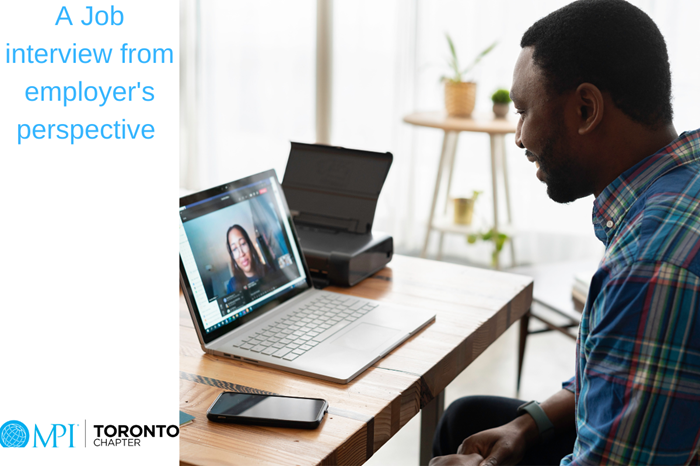How do you get the highest ROI on membership dollars for joining MPI? Get Involved!
Get Involved
A Job Interview From An Employer Perspective
Before I started to write this, I had to do some research as I am not in HR. However, I have been an interviewer through the years with many of my employers. Some questions popped up.
What did I learn that would help me be better as an interviewee?
How would I be if I were interviewing for the first time?
What could I do if I am changing careers and haven’t interviewed in a few years?
Aside from these possible scenarios, the pandemic presented various challenges for the hospitality industry. Here are my tips to help YOU prepare for your next interview from the viewpoint of an employer.

- Today, the interview will likely be done virtually. That doesn’t mean that you should underplay the importance of the interview. Typical rules still apply: dress for success (put on a nice suit, skirt or dress); arrive 5-10 minutes early to ensure you can access the platform and to test your audio and video connections. Set up in a location without distractions and with a clean background. You want the interviewer to be able to see and hear you clearly without a funny background. Turn off your cell phone. If you need visual or hearing support, ensure you ask ahead for time for them to accommodate.
- Come prepared! Do your research on the company and even on the interviewer (if you know). Find out their mission statement, look on their social media sites to see what people are saying. Find out what other job postings are listed (are they looking to fill several positions?). Discover items that you can use as talking points in your responses. For example: “I recently read the article on hybrid events that was on your LinkedIn and…” and add key points from the article. See if you can find out their Diversity, Equality and inclusion position and use this in your interview. And does the interviewer have a personal LinkedIn account? Are they socially active for the company?
- Brainstorm potential questions the interviewer may ask and then prepare and practice your answers in advance. You can find a laundry list of potential questions online to help you. The most common are situational and how YOU handled yourself, took care of a problem, interacted with difficult clients or colleagues, etc. The interviewer does not want you to recite your resume; rather expand on it with clear examples of results. They also want to know that you can think on your feet, be supportive and solve problems. Your responses should also link back to the job description showing that you read it.
- Research goes both ways. An employer might research candidates during the interview process. Very likely before the second or final round. The interviewer may come with a preconceived idea of who you are. This is confirmation bias. Most interviewers (and sometimes interviewees) make a snap judgment in the first 10 seconds of meeting someone. The first impression counts. However, was that impression made from your Instagram posts or by you at the start of the interview? Be aware this may be occurring and be mindful of your social media posts.
- The employer has taken the time to assess there is a need to fill a position, whether the role is now vacant, or they are expanding. Finding out WHY is a good question to pose either at the beginning or at the end of the interview. Prepare two or three questions you can ask at the end, and this WHY would be a great one! The answer will help YOU know how the department operates and what you may expect in terms of workload. There might even be a follow-up question you can pose based on the answer received such as “so you are filling an existing role, could you elaborate as to what was missing or what attributes are you looking for?”
Final tip: send a thank you note/card. As stated at the start of this article, don’t underplay the importance of a virtual interview and always send a thank you note or card. Pro tip is to send a handwritten note. Find the office address online. While most people are working remotely, you can send it to their office and it should be re-routed to their remote office.
About the Author:
 Erinn Young, HVED
Erinn Young, HVED
Conference & Event Service Manager
Ontario Bar Association

Leave a commentOrder by
Newest on top Oldest on top